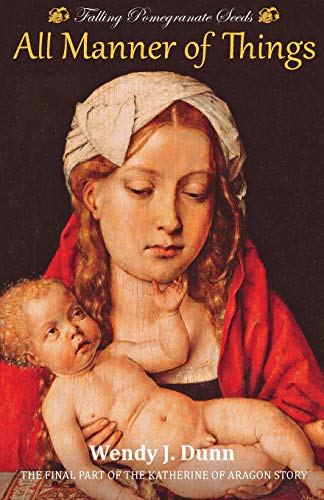All Manner of Things
All Manner of Things is based on the life of Katherine of Aragon. Narrated by Maria de Salinas, a friend and confidante of Katherine’s since childhood, the novel follows Katherine (Catalina) on her journey from young Castilian princess to her marriage and ultimate tragic divorce from the Tudor king of England, Henry VIII.
It is not an unfamiliar story. Women of the upper classes were abused by their male counterparts in ways that made life an arduous undertaking. Not only were they pawns in the political machinations of their male relatives, their bodies were often the object of the physical pleasure of men to be used and discarded. Babies died in childbirth. Surviving daughters followed their mothers on the same predestined pilgrimage.
In many ways, author Dunn stands alongside rival authors of Tudor England, Jean Plaidy and Philippa Gregory. You immediately feel part of Catalina’s inner court, suffer with them, and share their joys and sorrows, pain, and fear. Dunn sets you into that world with great skill. But is the story Catalina’s, or is it Maria’s?
We readers aren’t royals. Neither is Maria. She suffers the same villainies as Catalina and must make the ultimate sacrifice in regards her own daughter. It is this parental nightmare that is unfamiliar territory. It is here where the true drama lies. And yet Maria’s daughter isn’t even a character in the novel, just the recipient of letters Maria writes to her. Had this mother-daughter story been intertwined with Catalina’s stark yet familiar history, All Manner of Things, for me, would have been more powerful. Maria’s introspections are too frequent and too repetitious. Fiery and emotional interactions between Maria and her daughter, intermingled and paralleling Catalina’s trials, would have lifted this novel to another level.










